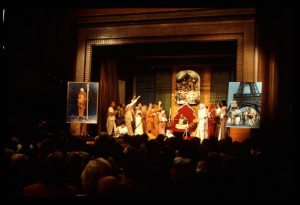SB 5.1.31: Difference between revisions
m (1 revision(s)) |
No edit summary |
||
| Line 1: | Line 1: | ||
{{info | {{info | ||
|speaker= | |speaker=Śukadeva Gosvāmī | ||
|listener=King | |listener=King Parīkṣit | ||
}} | }} | ||
[[Category:Srimad-Bhagavatam - Canto 05 Chapter 01]] | |||
[[Category:Bhagavatam Verses Spoken by Sukadeva Gosvami - Vanisource|050131]] | |||
<div style="float:left">'''[[Srimad-Bhagavatam]] - [[SB 5|Fifth Canto]] - [[SB 5.1: The Activities of Maharaja Priyavrata|Chapter 1: The Activities of Mahārāja Priyavrata]]'''</div> | |||
<div style="float:right">[[File:Go-previous.png|link=SB 5.1.30]] '''[[SB 5.1.30]] - [[SB 5.1.32]]''' [[File:Go-next.png|link=SB 5.1.32]]</div> | |||
{{RandomImage}} | |||
==== TEXT 31 ==== | ==== TEXT 31 ==== | ||
<div | <div class="verse"> | ||
ye vā u ha tad-ratha-caraṇa-nemi-kṛta-parikhātās te sapta sindhava āsan yata eva kṛtāḥ sapta bhuvo dvīpāḥ | :ye vā u ha tad-ratha-caraṇa-nemi-kṛta-parikhātās te | ||
:sapta sindhava āsan yata eva kṛtāḥ sapta bhuvo dvīpāḥ | |||
</div> | </div> | ||
| Line 13: | Line 20: | ||
==== SYNONYMS ==== | ==== SYNONYMS ==== | ||
<div | <div class="synonyms"> | ||
''ye''—that; ''vā u ha''—certainly; ''tat-ratha''—of his chariot; ''caraṇa''—of the wheels; ''nemi''—by the rims; ''kṛta''—made; ''parikhātāḥ''—trenches; ''te''—those; ''sapta''—seven; ''sindhavaḥ''—oceans; ''āsan''—became; ''yataḥ''—because of which; ''eva''—certainly; ''kṛtāḥ''—were made; ''sapta''—seven; ''bhuvaḥ''—of the Bhū-maṇḍala; ''dvīpāḥ''—islands. | |||
</div> | </div> | ||
| Line 20: | Line 27: | ||
==== TRANSLATION ==== | ==== TRANSLATION ==== | ||
<div | <div class="translation"> | ||
When Priyavrata drove his chariot behind the sun, the rims of his chariot wheels created impressions that later became seven oceans, dividing the planetary system known as Bhū-maṇḍala into seven islands. | When Priyavrata drove his chariot behind the sun, the rims of his chariot wheels created impressions that later became seven oceans, dividing the planetary system known as Bhū-maṇḍala into seven islands. | ||
</div> | </div> | ||
| Line 27: | Line 34: | ||
==== PURPORT ==== | ==== PURPORT ==== | ||
<div | <div class="purport"> | ||
Sometimes the planets in outer space are called islands. We have experience of various types of islands in the ocean, and similarly the various planets, divided into fourteen lokas, are islands in the ocean of space. As Priyavrata drove his chariot behind the sun, he created seven different types of oceans and planetary systems, which altogether are known as Bhū-maṇḍala, or Bhūloka. In the Gāyatrī mantra, we chant, oṁ bhūr bhuvaḥ svaḥ tat savitur vareṇyam. Above the Bhūloka planetary system is Bhuvarloka, and above that is Svargaloka, the heavenly planetary system. All these planetary systems are controlled by Savitā, the sun-god. By chanting the Gāyatrī mantra just after rising early in the morning, one worships the sun-god. | Sometimes the planets in outer space are called islands. We have experience of various types of islands in the ocean, and similarly the various planets, divided into fourteen ''lokas'', are islands in the ocean of space. As Priyavrata drove his chariot behind the sun, he created seven different types of oceans and planetary systems, which altogether are known as Bhū-maṇḍala, or Bhūloka. In the Gāyatrī ''mantra'', we chant, ''oṁ bhūr bhuvaḥ svaḥ tat savitur vareṇyam.'' Above the Bhūloka planetary system is Bhuvarloka, and above that is Svargaloka, the heavenly planetary system. All these planetary systems are controlled by Savitā, the sun-god. By chanting the Gāyatrī ''mantra'' just after rising early in the morning, one worships the sun-god. | ||
</div> | </div> | ||
__NOTOC__ | |||
<div style="float:right; clear:both;">[[File:Go-previous.png|link=SB 5.1.30]] '''[[SB 5.1.30]] - [[SB 5.1.32]]''' [[File:Go-next.png|link=SB 5.1.32]]</div> | |||
__NOTOC__ | |||
__NOEDITSECTION__ | |||
Revision as of 17:59, 5 May 2021

A.C. Bhaktivedanta Swami Prabhupada
TEXT 31
- ye vā u ha tad-ratha-caraṇa-nemi-kṛta-parikhātās te
- sapta sindhava āsan yata eva kṛtāḥ sapta bhuvo dvīpāḥ
SYNONYMS
ye—that; vā u ha—certainly; tat-ratha—of his chariot; caraṇa—of the wheels; nemi—by the rims; kṛta—made; parikhātāḥ—trenches; te—those; sapta—seven; sindhavaḥ—oceans; āsan—became; yataḥ—because of which; eva—certainly; kṛtāḥ—were made; sapta—seven; bhuvaḥ—of the Bhū-maṇḍala; dvīpāḥ—islands.
TRANSLATION
When Priyavrata drove his chariot behind the sun, the rims of his chariot wheels created impressions that later became seven oceans, dividing the planetary system known as Bhū-maṇḍala into seven islands.
PURPORT
Sometimes the planets in outer space are called islands. We have experience of various types of islands in the ocean, and similarly the various planets, divided into fourteen lokas, are islands in the ocean of space. As Priyavrata drove his chariot behind the sun, he created seven different types of oceans and planetary systems, which altogether are known as Bhū-maṇḍala, or Bhūloka. In the Gāyatrī mantra, we chant, oṁ bhūr bhuvaḥ svaḥ tat savitur vareṇyam. Above the Bhūloka planetary system is Bhuvarloka, and above that is Svargaloka, the heavenly planetary system. All these planetary systems are controlled by Savitā, the sun-god. By chanting the Gāyatrī mantra just after rising early in the morning, one worships the sun-god.